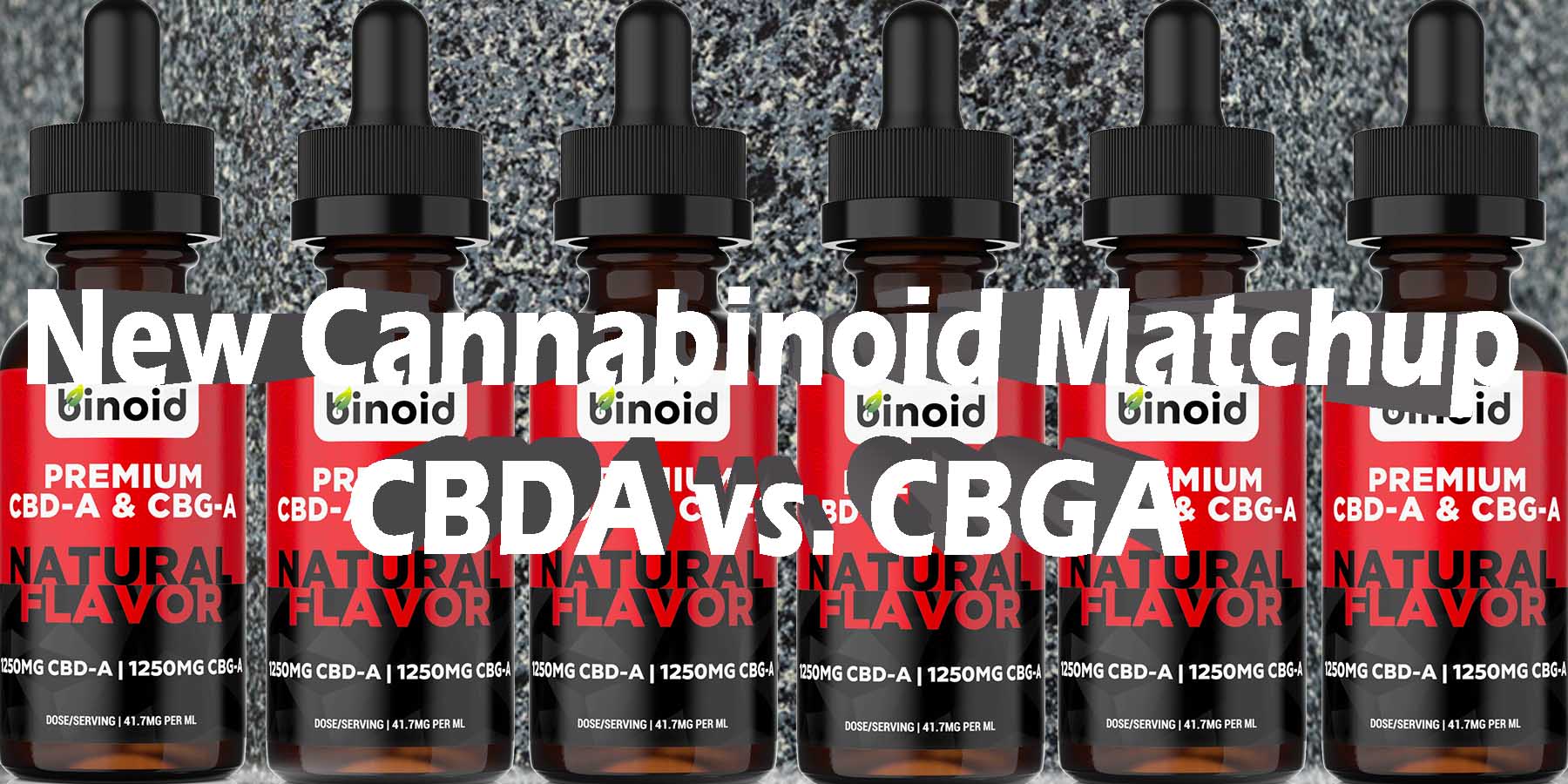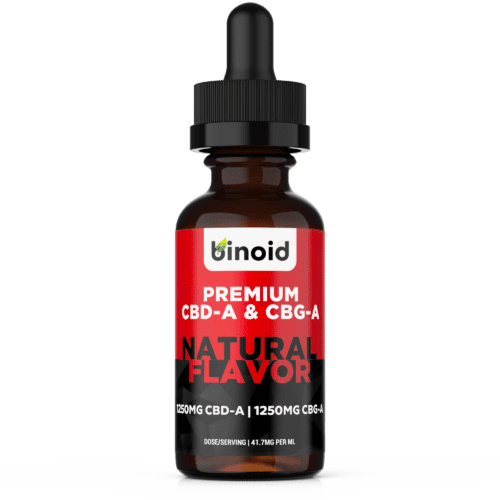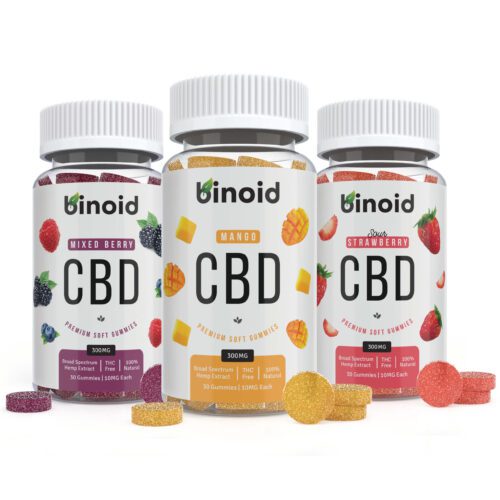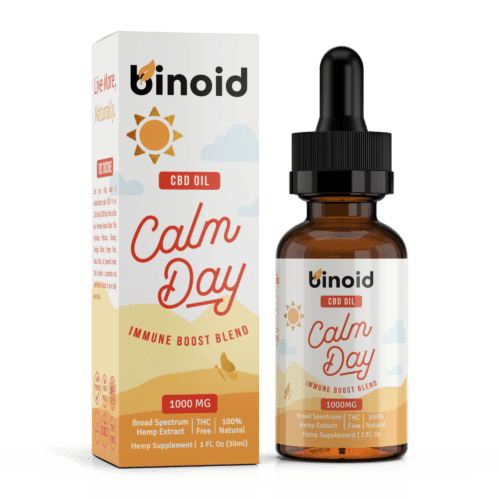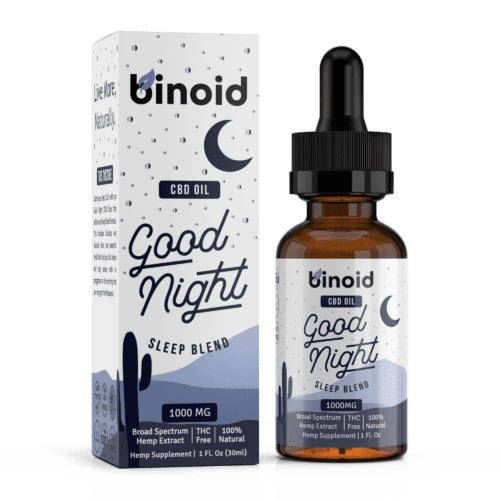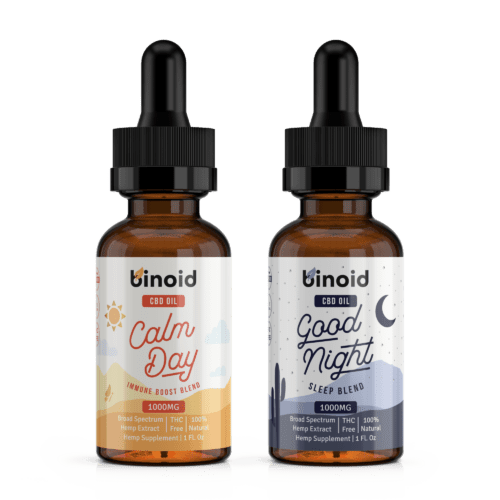The cannabinoids that we tend to focus on, like cannabidiol (CBD), cannabigerol (CBG), delta-8-tetrahydrocannabinol (delta-8 THC), delta-10-tetrahydrocannabinol (delta-10 THC), and so on, are all the result of a process known as “decarboxylation:, in which heat is applied to a cannabinoid to activate specific properties deemed desirable. How? By altering the way in which it interacts with the body’s endocannabinoid system (ECS). Virtually all hemp products that you encounter on the market have been decarboxylated, and even raw flower is decarboxylated by the user, as it’s heated through smoking, vaping or cooking.
But, what about these cannabinoids in their raw forms? Back in the day, we didn’t consider them valuable at all. Hard to believe, we know. But now, with tons of research going into understanding the hemp plant, it is pretty much clear we’ve been wrong all this time. Cannabinoids in their raw and acidic form actually have distinctive properties that are worth exploring all on their own. Perhaps the two greatest examples are CBDA and CBGA, which may very well be game-changers based on recent studies into their effects.
To Buy CBDA Products Click Here
Recommended products
CBDA (Cannabidiolic Acid)
Origins: Cannabidiolic Acid is the raw precursor to CBD, and so it’s not surprising that CBDA in raw hemp plant material is the most abundant chemical compound. Cannabidiolic acid is converted into cannabidiol only after it’s been heated using a controlled decarboxylation process.
Psychoactive Properties: CBDA is non-intoxicating. One would assume this given what we now about CBD, which has zero psychoactive properties. But in fact, all cannabinoids in their raw form are non-intoxicating, which is why you can’t get high from eating raw cannabis flower.
Other Properties Associated with CBDA
Again, the main focus of Cannabidiolic Acid is its non-psychoactive properties. While there are only a handful of studies on CBDA compared to its sister cannabinoid CBD, we’re already finding that this acidic cannabinoid may be powerful in its potential to address all kinds of daily needs because of its distinctive relationship with the body’s endocannabinoid system.
- Serotonin-Enhancing Effects: CBDA has been most widely researched for its impacts on 5-ht receptors, which specifically increase serotonin uptake. Serotonin is a neurotransmitter mainly discussed when it comes to the topic of depression, because this neurotransmitter is responsible for our ability to experience happiness and contentment. Those with depression typically struggle with serotonin uptake. But, serotonin also plays important roles in sleep, metabolization, sexual function and more.
- Anti-Inflammatory Properties: Many cannabinoids are associated with anti-inflammatory effects, but CBDA’s relationship with inflammation is a bit different from the rest. While other cannabinoids have a more regulatory role in existing inflammation levels, CBDA seems to inhibit the precursor enzyme that leads to inflammation, which is known as COX-2, therefore potentially offering a more prophylactic-like effect. Right now, studies show that the anti-inflammatory potential of CBDA could be compared to that of popular NSAIDs.
Recommended products
- Anti-Nausea Properties: CBDA may help with nausea as this is another physiological response that comes from 5-ht receptors.
- Properties Relating to SARS-CoV-2: Only recently, a study was released that showed that CBDA, along with CBGA, has the potential to prevent SARS-CoV-2 from infiltrating the cells of the body and creating the more severe form of COVID that makes the disease lethal. It seems that CBDA and CBGA attach themselves to the spike protein of the virus, changing its physical structure in a way that inhibits its ability to absorb into the cells of the body and lead to severe illness through damaging lung tissue and the tissue of other bodily organs.
Legality: Cannabidiolic Acid is a completely legal derivative of the hemp plant, both federally and throughout all 50 states. This is due to its intoxicating nature, as it’s a very uncontroversial cannabinoid.
CBGA (Cannabigerolic Acid)
Origins: Cannabigerolic Acid is the raw, acidic precursor to CBG prior to decarboxylation. Interestingly, CBGA is the precursor to CBDA, and therefore CBD, as well. CBGA is commonly referenced as “the mother cannabinoid” because it’s also the precursor to THC. Exists abundantly in the plant material prior to its complete maturation, after which it naturally converts itself into CBD, THC, and other prominent cannabinoids. This means that to produce CBGA, it must be extracted from the plant before it’s finished maturing, as after a certain point, it has already converted into other cannabinoids.
Psychoactive Properties: Like CBDA and CBG, CBGA is non-intoxicating, in any concentration level. The cannabinoid does not possess psychoactive properties in either its raw or decarboxylated form, and as we said earlier, no raw forms of cannabinoids are intoxicating.
Recommended products
Other Properties Associated with CBGA
Cannabigerolic Acid has been studied even less extensively than CBDA, and again that’s because of the emphasis that goes into studying the more notable properties of decarboxylated cannabinoids. But, as is the case with CBDA, studies on CBGA do exist and there will only be more in the future now that there’s growing interest in raw cannabinoids.
- Anticonvulsant Properties: Studies show that CBGA can play a role in balancing the neurological system, acting as a neuroprotectant much like many cannabinoids that we’re already familiar with. CBGA could therefore offer yet another hemp derivative that specifically relates to managing the symptoms of epilepsy, by reducing electrical activity between neural pathways.
- Cardiovascular Properties: CBGA may lower oxidative stress that can have damaging effects on the cardiovascular system, leading to heart disease and similar ailments. This is extremely promising as heart disease is one of the most common killers in the world.
- Metabolism Regulation: More research is going into studying the link between cannabinoids and metabolism, and CBGA is showing much promise in this area. CBGA may play a role in the maintenance of energy homeostasis and metabolism, and even work against metabolic dysfunction.
- Properties Relating to SARS-CoV-2: The same study referenced earlier found that CBGA, along with CBDA, may offer a positive effect against SARS-CoV-2, by preventing the spike protein from absorbing into human cells.
Legality: Like CBDA, CBGA is a completely legal cannabinoid federally and in all 50 states throughout the country.
Recommended products
CBDA or CBGA: Which is Right for You?
Both CBDA and CBGA show a lot of promise, and both are making their way onto the market in the many product forms that we’re already familiar with. So, which one is right for you? Given the distinctive potential of each one, we have to say that both are worth giving a try, as they can work together to provide you with widespread properties that each affect the function of the body.
As is always the case with cannabinoids, make sure that you’re buying your CBDA and CBGA products from a trusted source like Binoid. Not only that, but you will need to talk with your doctor if you’re taking any medications (prescription or non-prescription), since either cannabinoid can suppress the CYP3A4 enzyme that metabolizes commonly used drugs. Otherwise, we encourage you check out these awesomely raw cannabinoids for yourself and experience an entire new side of the hemp plant.

